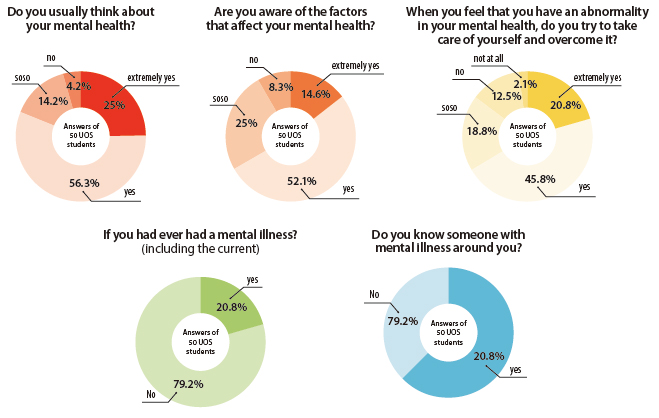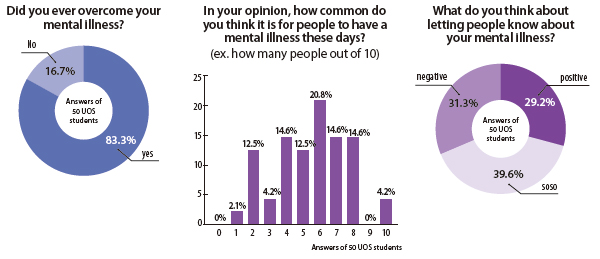Many university students in Korea experience stress from competition for grades and career. For these reasons, students sometimes suffer from mental problems like psychological depression, pressure and anxiety. This fact is shown through various statistical data.
Oh Hye-young, a professor at Ewha Womans University’s student counseling center, conducted a survey of 2,600 students last year on their psychological status and school adaptation of the total respondents. Of the total respondents, 74.5 percent (41.2 percent for risk groups and 34.2 percent for potential risk groups) were classified as potential risk groups for anxiety symptoms. And 43.2 percent of the total respondents complained of difficulties caused by depression.
In addition, 14.3 percent of the respondents were found to be in the potential suicide risk group. Not only that, about 1.6 percent of students have attempted suicide in the past year, which is twice the rate of suicide attempts in Korea. Also, according to a survey by the Health Insurance Review and Assessment Agency, the number of patients with mental health illnesses increased the most in the people in their 20s during the year 2013 ~ 2017 period. These data show that quite a lot of the university students face a psychological crisis.
Also, experts point out that the proportion of high-risk students is increasing slightly compared to the past, and the level of risk is becoming more serious.
Then what is the cause of this problem? The competitive academic atmosphere of Korea has a big impact. As soon as Korean students get out of the competition for university entrance exams, they suffer from a different kind of stress such as competition to get a job and building up experience to become more qualified for a job. In this atmosphere, the mental health problem is usually more likely to be neglected for various reasons such as over-emphasized value of studying, and oppression from studying. Students were forced only to concentrate on studying from early in their childhood, so when they enter university, they often have trouble adjusting to a new environment. Especially, they experience extreme stress from sudden loss of goals and difficulties in forming relationships.

Then, what about the University of Seoul (UOS) students? Do they have this problem, too? To look into the real condition and awareness of mental health of our students, The UOS Times conducted a survey on 50 students.
In response to the question “Do you usually think about your mental health?”, 81.3 percent said that they usually do. This figure is much more than The UOS Times expected, and it shows that UOS students are paying attention to their mental health. Only 4.2 percent of respondents said that they do not usually think about their mental health. On the next question, “Are you aware of the factors that affect your mental health?”, 66.7 percent of the respondents said yes. Stress accounted for the largest proportion of responses among factors affecting mental health, followed by people around them, sleep, career and study. For the question “When you feel that you have an abnormality in your mental health, do you try to take care of yourself and overcome it?”, 66.6 percent of the respondents said yes. To sum up, students know the factors that affect their mental health and try to overcome the problem on their own. These results prove once again that they are paying attention to their own mental health.
When we asked respondents if they had ever had a mental illness (including the current), 20.8 percent of the respondents said they had it. The very next question was “Do you know someone with mental illness around you?” and 62.5 percent said they did. As you can see, there is a huge gap between results of questions that asked about their own mental illness and mental illness around them. This seems to be because not only university students, but also various age groups can be included as people around them. And it is also assumed that there are some students who do not want to talk about their own difficult experiences from the past.
Meanwhile, for the question “Did you ever overcome your mental illness?”, 16.7 percent said yes. It is lower than the percentage of people who ever had a mental illness (including the current). This means that there still are students who have not overcome their mental illness. We then asked how they overcame their mental illness. This question allowed students to choose from more than one answers. Most of the respondents said they tried on their own, followed by psychiatric treatment, the help of the people around them, and other treatments.

We also asked students “In your opinion, how common do you think it is for people to have a mental illness these days? (ex. how many people out of 10)” and six was recorded the highest percentage, which was 20.8 percent. It was followed by four, seven, eight, which recorded the same percentage, 14.6. The average was about 5.45. No one answered that it would be zero. Only 4.2 percent said it would be 10. Through this, we could guess that students think mental illness is something they can commonly find and something everyone may have.
When asked “What do you think about letting people know about your mental illness?”, the negative response was 31.3 percent, higher than the positive response which was 29.2 percent. Many of the respondents said they were negative because of the eyes around them, prejudice, and the fear of revealing their shortcomings. This shows that there is still a social bias that views mental illness negatively among university students.
To refer to expert views about the survey and to find a way forward, we interviewed Seo Eu-Gene, who is the chief of Psychological Counseling Department in UOS and has worked in this area for ten years. Psychological Counseling Department is a part of Human Rights Center with the other three departments, Human Rights Counseling Department, Sexual Harassment and Sexual Violence Counseling Department, and Department of Support for Disabled Students. The center provides counseling for free for UOS students and conducts various campaigns and activities.
During the interview, we found out that almost 1,500 students signed up for the counseling program last year. It means many students have their own concerns and need someone to listen. Looking at the topic distribution of counseling, we could see that the largest portion is concerns of emotions which is 22 percent and the following option is family and interpersonal relationship which is 20 percent. Prof. Seo mentioned that interpersonal relationship is basic for every part of our life, so concerns of emotion also could be deprived from relationship problems. According to the prof. Seo, interpersonal problems have been the main issue of the student counseling for ten years in a row. However, it seems that more and more students have stress from studying, career, and try to harm themselves and make suicide attempts. It is because they judge themselves way too harshly. Their high judgment prevents them from feeling what is right to feel. They suppress the feelings of emotions such anger and fall into self-made trap-depression. People unconsciously feel emotions so normally they can’t notice what is going on inside their mind, so when their emotions are not expressed, they just rot.
To overcome this, having counseling is one of the great solutions. Counseling is a time that people can open their mind comfortably. We usually have lots of conversations and talk about ourselves, but it’s hard to show our story deep inside. During the counseling, the counselor helps to meet ourselves, the ones that we couldn’t have known about and force us to see what we wanted to avoid. Through these times, we can figure out our problems and move on to solutions. Prof. Seo also suggested other ways to overcome mental illness and it’s quite interesting. First, religious faith positively affects patients. There are some cases where people heal their mind through religious activities like meditation and pray. Blind trust and love of God could give them good energy to overcome their problems. Second, healthy relationship can heal one’s mental wound. As I mentioned earlier, people live with various relationship such as childhood relationship, and especially family relationship is of great importance to later life. Once they got hurt through abnormal relationship, it’s really hard to change their mind about people. However, if they have someone who truly loves them or they are acknowledged inside the community that they belonged to, there will be a great possibility for change. Both treatments prove the power of love.
According to the statistics, more than half of the respondents had someone around them with mental illness like depression. Then what is a right way to treat these people? The answer is very simple. Just treat them as usual. Most of the light mental illness concerns oneself rather than causing damage to others. For example, Prof. Seo asked us how you feel when you see a friend who recently broke up with a boyfriend/girlfriend. He or she will spend tough time and lose one’s senses, but we don’t think it’s abnormal or serious. We know that he or she will recover soon, so just listen to them and try to cheer them up.
If you think like this, difficulties in dealing with ill people around you will be reduced. Also, in the other question, many of the respondents said they were negative to disclose their illness because of the eyes around them, prejudice, and the fear of revealing their shortcomings. It shows that social awareness is still low compared to the increase in the number of people who are mentally ill. Prof. Seo recommends telling close people and requesting help. It is because if people are severely depressed, they don’t have any will to cure themselves, so it is mandatory to have someone to care for them. Mental illness is not something strange at all so you should be confident.
Until now, we figured out what kinds of mental difficulties that university students have and how we can overcome them. People get used to excessively competitive society from a very young age and it makes them unbearable and depressed. To not be like this, we should keep on listening carefully to our mind and condition. Usually, the symptoms of mental illness are so obvious that you can recognize them right away; like lack of physical function like insomnia, decreased concentration, increased fatigue, etc. Besides, there is no record of prescription of depression or anxiety nowadays so don’t hesitate to get some help. The best solution is of course that our society will be changed to be less competitive, but it’s very hard to change suddenly. Therefore, we should do what we can, which is to care about myself and the people around us to make a better society step by step.

Choi Hyun-Jung
guswjd5891@uos.ac.kr
Park Ji-yeong
vipp0925@uos.ac.kr

